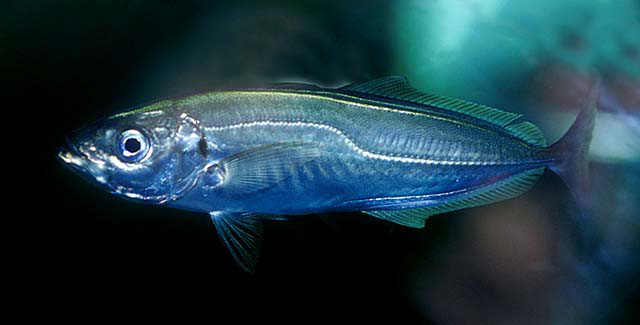| Carangidae (Jacks and pompanos), subfamily: Caranginae |
| 70 cm TL (male/unsexed); max.weight: 2,000.0 g |
|
pelagic-neritic; depth range 0 - 1050 m, oceanodromous |
| Mediterranean Sea and eastern Atlantic: Norway to South Africa, round the coast to Maputo. |
|
Dorsal spines (total): 9-9; Dorsal soft rays (total): 30-36; Anal spines: 3-3; Anal soft rays: 24-32. Bluish green, grey or black above, silvery white below; opercle with black spot (Ref. 3197). Lateral scales tall and keeled. Gill cover with a distinct black spot. First dorsal fin tall (Ref. 35388). |
| Adults form large schools in coastal areas with sandy substrate. They feed on fish, crustaceans, and cephalopods. Are batch spawners (Ref. 51846). Females lay 140,000 eggs, which hatch into 5mm long larvae (Ref. 35388). Eggs are pelagic (Ref. 4233). Utilized fresh, smoked, canned and frozen; can be fried, broiled and baked (Ref. 9988). Divided into two stocks: West stock and North Sea stock. West stock spawns in a belt from the Biscay to Ireland in early spring, migrates north and eastwards to southern Norway and northern North Sea. North Sea stock spawns in the southern North Sea in summer, migrates to central North Sea, Skagerrak and Kattegat. |
|
Vulnerable (A2bd)
(Ref. 96402)
|
| harmless |
|
Source and more info: www.fishbase.org. For personal, classroom, and other internal use only. Not for publication.
Page created by Jen, 05.08.02,
php script by kbanasihan 06/09/2010 ,
last modified by
dsantos, 20/08/10

